In Ghana, the term ‘blogging’ has become a household name in the media space with a lot of young men and women venturing into it. Blogging became popular due to the sharp rise in the use of social media platforms to disseminate
information to the public.
The space, however, seem to have been flooded with a variety of persons who may or may not be qualified to disseminate information to the public. Blogging which is literally some form of journalism seem to have attracted attention in Ghana, amid the style and kind of sensational information they churn out. Persons who do not have any journalism background have all got to call themselves bloggers because they created a space on social media and broadcasting information.
This phenomenon which has gaining notoriety in the Ghanaian media space must be scrutinized by the National Communication Authority and other media regulatory bodies.
One important reason the NCA must begin to rethink laws that will regulate this aspect of our media space is because information is vital in making or breaking a country. Media plays a big role in every country as it is considered by many scholars as the fourth most powerful group in Ghana.
If media surely plays a big role, then the information that comes out through the various media outlets must be checked. Many are of the view that social media is a free space that do not require regulations but I beg to differ
considering the developments especially with the kind of information that are being churned out to the masses.
Any misinformation being disseminated through the various blogs and social media platforms should be of interest to the NCA and the National Security. As the case in Ghana, just anyone could stand up, not go through any measures or State checks and create a blog to disseminate information. They often use click-bait and other styles of misinforming the masses to gain traffic on their blogs and
followers on their social media platforms.
This act which seems to be gaining grounds in Ghana has gone a long way to affect individuals and some institutions. Self-acclaimed social media influencers have gone the extra mile to blog false information to the public
because they have probably been paid to do so.
Others have advertised products that has not been authorized and approved by the FDA, Standards Authority among others. On the other hand, false publications and social media comments have been made to abuse other Ghanaians without the blogger getting sanctioned.
I do not think social media was created to misinform the masses and attack the personality of individuals or firms inappropriately. In as much as social media is a free platform, the Government of Ghana through its mandated regulatory institutions must discuss the ‘current social media misinformation craze’ and find a lasting law that will curb the situation.
If ignored, the fallouts from blogs and social media platforms misinforming the masses can go a long way to disturb the peace we have especially going into the general elections next year.
Opinions of Thursday, 6 April 2023
Columnist: Kwame McJoseph



















